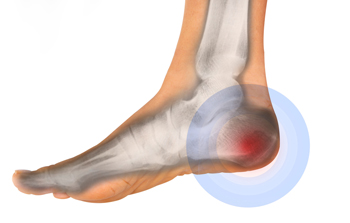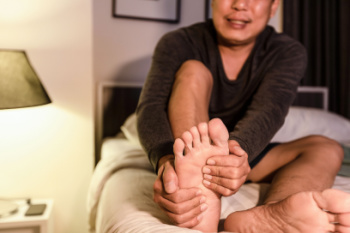
Selecting the proper shoes for marathon running is essential to ensure comfort, performance, and injury prevention. The ideal running shoe should match your foot type, gait, and running style. It is important to choose a shoe that offers adequate cushioning to absorb impact while providing support and stability over long distance. Trying on shoes later in the day, when feet are slightly swollen, can give a more accurate fit. A snug but not tight fit is key, with enough room in the toe box to accommodate foot movement. Prioritizing comfort and function over style will help you stay focused on your training. If you are considering running in a marathon, it is suggested you confer with a podiatrist who can help you choose shoes that are right for you.
If you are a runner, wearing the right running shoe is essential. For more information, contact Dr. Douglas Mckay from New Jersey . Our doctor can provide the care you need to keep you pain-free and on your feet.
Choosing the Right Running Shoe for Your Foot Type
To increase performance and avoid the risk of injury, it is important to choose the right running shoe based on your foot type. The general design of running shoes revolves around pronation, which is how the ankle rolls from outside to inside when the foot strikes the ground.
- Neutral runners are able to choose from a wide variety of shoes, including minimalist shoes or even going barefoot.
- Runners who overpronate, or experience an over-abundance of ankle rolling, should choose shoes that provide extra motion control and stability.
- Runners who underpronate, or supinate, have feet that have high arches and lack flexibility, preventing shock absorption. They require shoes with more flexibility and cushion.
If you have any questions please feel free to contact one of our offices located in Caldwell, and Galloway, NJ . We offer the newest diagnostic and treatment technologies for all your foot and ankle needs.

A broken heel bone, or calcaneus fracture, is a serious foot injury that often results from high-impact trauma, such as falling from a height or being in a car accident. In some cases, athletes who engage in repetitive stress, like long-distance running, may develop a stress fracture in the heel. Signs of a broken heel bone include intense heel pain, swelling, bruising, and an inability to walk. A podiatrist will perform a thorough exam, which may include imaging tests, to determine the severity of the fracture. If the bone fragments remain in proper position, casting and immobilization may be sufficient. However, when the bone is significantly displaced or if the fracture is open, surgery may be necessary. This typically involves repositioning the bone and securing it with plates and screws. In the most severe cases, a fusion between the heel and ankle bones may be required to stabilize the foot. If you have extreme heel pain and fear it may be broken, it is suggested that you make an immediate appointment with a podiatrist for an exam, diagnosis, and appropriate treatment.
Many people suffer from bouts of heel pain. For more information, contact Dr. Douglas Mckay of New Jersey . Our doctor can provide the care you need to keep you pain-free and on your feet.
Causes of Heel Pain
Heel pain is often associated with plantar fasciitis. The plantar fascia is a band of tissues that extends along the bottom of the foot. A rip or tear in this ligament can cause inflammation of the tissue.
Achilles tendonitis is another cause of heel pain. Inflammation of the Achilles tendon will cause pain from fractures and muscle tearing. Lack of flexibility is also another symptom.
Heel spurs are another cause of pain. When the tissues of the plantar fascia undergo a great deal of stress, it can lead to ligament separation from the heel bone, causing heel spurs.
Why Might Heel Pain Occur?
- Wearing ill-fitting shoes
- Wearing non-supportive shoes
- Weight change
- Excessive running
Treatments
Heel pain should be treated as soon as possible for immediate results. Keeping your feet in a stress-free environment will help. If you suffer from Achilles tendonitis or plantar fasciitis, applying ice will reduce the swelling. Stretching before an exercise like running will help the muscles. Using all these tips will help make heel pain a condition of the past.
If you have any questions please contact one of our offices located in Caldwell, and Galloway, NJ . We offer the newest diagnostic and treatment technologies for all your foot and ankle needs.

Your feet are constantly sending messages to your brain, about temperature, pain, and pressure, until one day, they do not. Foot neuropathy occurs when nerve damage disrupts these signals, leading to numbness, tingling, burning pain, or even a complete loss of sensation. For some, it starts subtly, like pins and needles that come and go. For others, it is sharp, electric-like pain that worsens at night. Diabetes is a major cause, but injuries, infections, chemotherapy, and even vitamin deficiencies can trigger nerve damage. The danger in this is that without feeling pain, small cuts or pressure sores can go unnoticed, leading to serious complications. There is no quick fix, but early intervention helps slow progression. Managing underlying conditions, improving circulation, and using protective footwear can reduce discomfort. If your feet feel different than they used to, it is suggested that you see a podiatrist for evaluation and appropriate treatment.
Neuropathy
Neuropathy can be a potentially serious condition, especially if it is left undiagnosed. If you have any concerns that you may be experiencing nerve loss in your feet, consult with Dr. Douglas Mckay from New Jersey . Our doctor will assess your condition and provide you with quality foot and ankle treatment for neuropathy.
What Is Neuropathy?
Neuropathy is a condition that leads to damage to the nerves in the body. Peripheral neuropathy, or neuropathy that affects your peripheral nervous system, usually occurs in the feet. Neuropathy can be triggered by a number of different causes. Such causes include diabetes, infections, cancers, disorders, and toxic substances.
Symptoms of Neuropathy Include:
- Numbness
- Sensation loss
- Prickling and tingling sensations
- Throbbing, freezing, burning pains
- Muscle weakness
Those with diabetes are at serious risk due to being unable to feel an ulcer on their feet. Diabetics usually also suffer from poor blood circulation. This can lead to the wound not healing, infections occurring, and the limb may have to be amputated.
Treatment
To treat neuropathy in the foot, podiatrists will first diagnose the cause of the neuropathy. Figuring out the underlying cause of the neuropathy will allow the podiatrist to prescribe the best treatment, whether it be caused by diabetes, toxic substance exposure, infection, etc. If the nerve has not died, then it’s possible that sensation may be able to return to the foot.
Pain medication may be issued for pain. Electrical nerve stimulation can be used to stimulate nerves. If the neuropathy is caused from pressure on the nerves, then surgery may be necessary.
If you have any questions, please feel free to contact one of our offices located in Caldwell, and Galloway, NJ . We offer the newest diagnostic and treatment technologies for all your foot care needs.


